Surprise attacks and ambushes can turn the tide of war. More often than not, the side that has the larger base of industry or manpower wins in the end, but occasionally a well-timed and placed surprise can turn the tables, quicken what would be an overly long war, or give the smaller side a fighting chance. Here are a few of the best-executed surprises throughout history.
1. The WW2 night-raid on Taranto Harbour
You would be hard pressed to find someone who hasn’t heard of the attack on Pearl Harbor, but few remember the much smaller ariel attack on the Italian harbor of Taranto. This took place at the start of November 1940, and it changed the balance of power in the Mediterranean at the time. Aerial attacks on naval targets were not unknown, but their effectiveness varied, often depending on the number of anti-aircraft defenses in place both on ships and around harbors, from guns to balloons or even torpedo-catching nets.Early in the war, the British faced a potentially powerful Italian navy largely stationed in Taranto. The Italians employed a strategy of defending the surrounding region by sitting tight in port with a strong amount of firepower, in this case, six battleships, 16 heavy and light cruisers, and 13 destroyers.
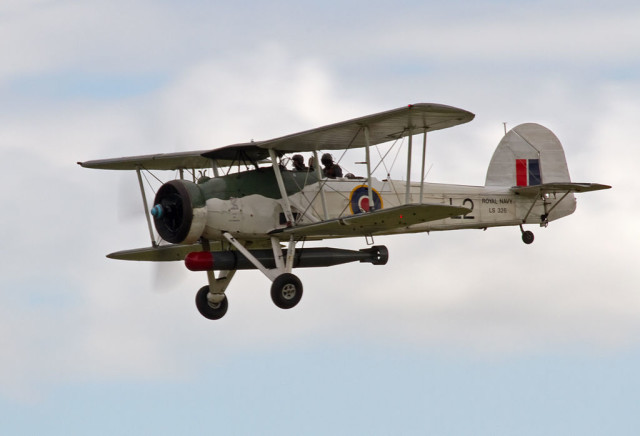
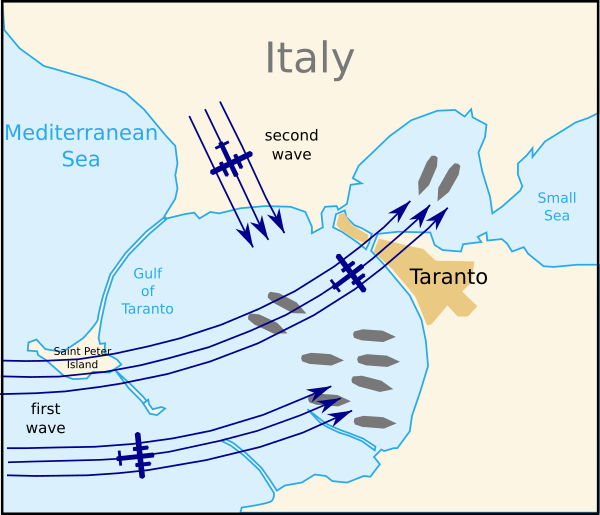
The attack came in two waves, bringing down one battleship and crippling multiple other battleships and cruisers, in addition to damaging the harbor and inflicting many casualties. The targets were difficult to identify, and the bombers described the run as hellish, one responding to a request for another run by saying “they only asked the Light Brigade to do it once.”
Despite the anti-aircraft fire, only two planes were brought down. One of the two-man flight crews was captured. The other was killed. Comparing damages especially given the small scale of the engagement, the attack on Taranto was an astounding success. The tide had certainly been turned in the Mediterranean as the British navy was able to exert much more influence, though the balance of power did shift again as the war progressed. This was the inspiration for the Japanese to attack Pearl Harbor. Also the United States had games similar war games in the 1930 with the Lexington and Saratoga.
2. No Way Out – Hannibal destroys a Roman Army
When Hannibal invaded Italy in 218 BC, he was taking on a Roman powerhouse that had a huge potential pool of well-trained soldiers. Hannibal would have to win decisive victories to show his seriousness and the inability of the Roman army to stop him.His first major battle in Italy at Trebia was an incomplete success as the Roman center broke free and escaped. Deeper in the forested hills of Italy, Hannibal attempted to trap an entire Roman army. Taking advantage of the overly aggressive pursuit of the Roman general Flaminius, Hannibal led the Romans onto a narrow path between Lake Trasimene and the rolling hills.
Hannibal had set a small force at the far side of the lake with large amounts of baggage, fire and plenty of smoke to imply that they were the rearguard of his army marching or preparing to march just over the next hill. Flaminius took the bait and sent his men in a pursuit column to quickly march along the narrow road between the hills and the coast.
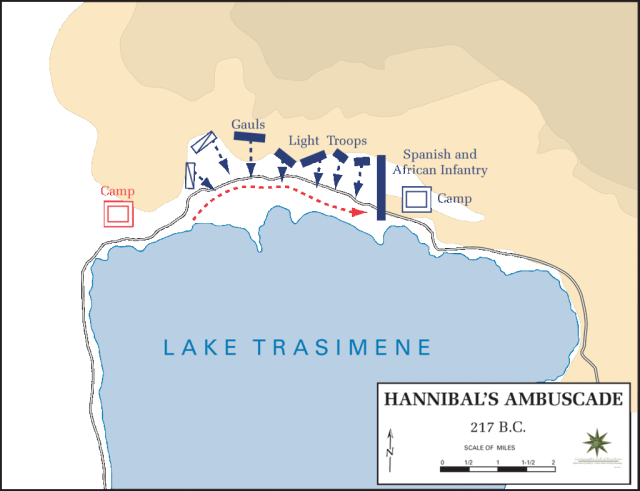
Little did Flaminius know that the hills he was squeezing past contained the vast majority of Hannibal’s hidden army. Once Flaminius’ force had all been funneled into the gap, the Carthaginians charged down the hills, smashing into the disorganized Roman marching column. Nearly the entire 30,000 man force was killed or captured. Many men drowned in the lake, cut off from any chance of retreat.
Hiding an entire army and coordinating a simultaneous attack was incredibly difficult in the ancient world, the battle of Lake Trasimene goes down in history as a testament to Hannibal’s amazing generalship. In terms of manpower, it remains the biggest successful ambush in history. Just a year later he would spring another successful trap in the open field against a much larger force at the Battle of Cannae.
3. Stonewall Jackson’s flanking attack at Chancellorsville
Deep into the American Civil War, Confederate General Robert E. Lee’s army was in danger of being trapped by a vastly larger force. Union Generals John Sedgwick and Joseph Hooker were in command of the attack. Sedgwick held the eastern flank while General Hooker attacked from the northwest with an army almost twice the size of Lee’s.Lee boldly divided his army into three and sent General Thomas “Stonewall” Jackson with a huge chunk of his force to flank the attackers.
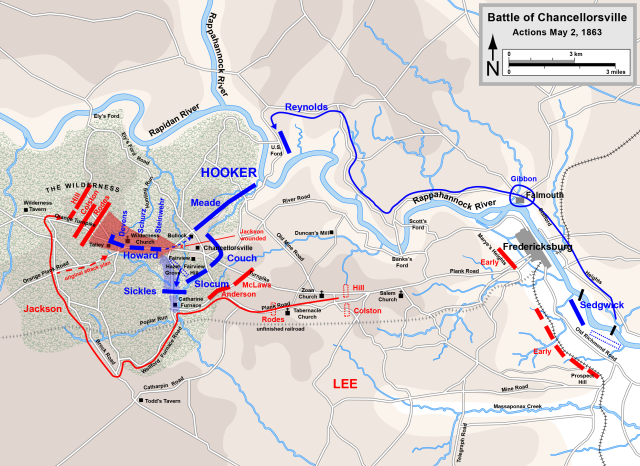
The next day, however, Lee and the flanking force were able to rout the numerically superior force under Hooker before heading eastward to take out Sedgwick. In one of Lee’s most impressive battles, he was able to take over half of his force and successfully flank a far larger army, all while facing a separate army on his flank, and succeeded in defeating both with extraordinary efficiency.
4. Operation Focus: The Sinai Air Strike
Israel is no stranger to being surrounded by hostile nations and people, they live with it every day and have for generations. In 1967, Israel faced an impending war with the surrounding nations of Egypt, Syria, and Jordan, with many other nations supporting those three. The limited territory of Israel made easy targets for enemy fighters and bombers. This, combined with the prospect of facing enemies with combined troop and tank numbers many times what Israel could field, led to the idea of a preemptive air strike.Egypt had the most modern air force of Israel’s enemies and became a major target for the planned strike. Israeli jets flew low out over the Mediterranean before turning south towards Egypt. They flew under radar range and below the effective altitude of Egypt’s surface-to-air missiles. Fighters strafed Egyptian aircraft easily as many were not under hardened hangars. Special bombs were dropped on the airfields -they were built specifically to cause heavy damage to the runways.
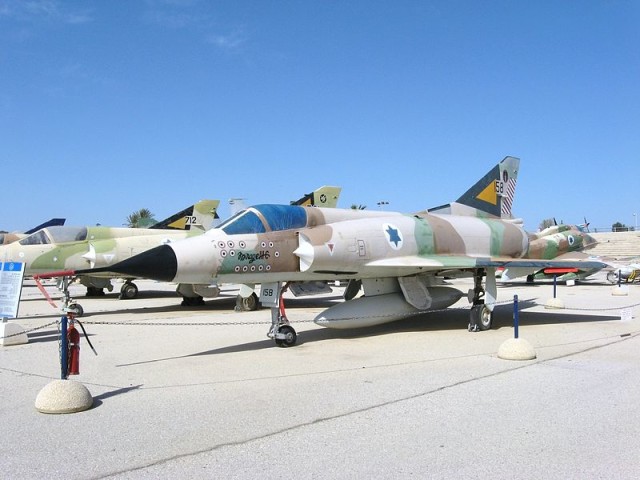
A third wave on the first day was diverted towards Syria and Jordan when those countries sent retaliatory bombers to Israel. This wave caused catastrophic damage and crippled the air power of all nations fighting against Israel. In the ensuing ground war, Israel’s air force continued to strike airfields and radar with great success. IAF assistance in ground engagements greatly altered the power balance of the war.
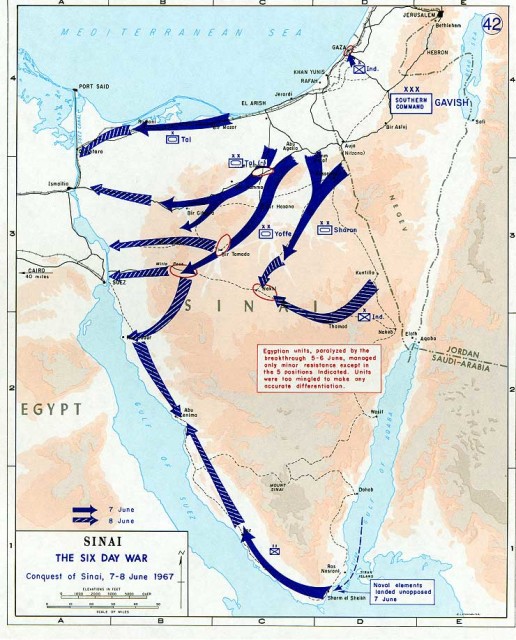

One of the earliest accounts of a surprise attack comes from Greek mythology: the Trojan Horse.
But the shocking assaults in 2001 on the World Trade towers, the Pentagon and the planned hit on the Capitol were not the first surprise attacks that changed the way humans do business.
Through the centuries, there have been unexpected strikes on civilian targets that occurred during wars — declared or not — and peacetime attacks that came completely out of the blue. The Sept. 11 attacks fall into the latter category.
Sudden assailments have toppled societies and shaken civilizations. The element of surprise can be a very potent change agent. And, perhaps, the most powerful weapon of all.
One of the earliest accounts of an epic surprise attack comes from Greek mythology: the Trojan Horse. The episode, explains George Dameron, a history professor at Saint Michael's College in Colchester, Vt., is associated with the 10-year war between Greeks and Trojans.
In one version of the tale, the Greeks finagle a way to get a large wooden horse inside the City of Troy. Inside the horse, Greek warriors hide. They emerge and, in a surprise attack, defeat the Trojans.
"The story may be based on an actual war," Dameron explains, "but the account of the war was certainly embellished over the centuries" between the event — fought during the 12th or 13th century B.C., the ancients believed — and its recounting in The Odyssey, written by Homer circa the 8th century B.C.
Virgil's first century poem, The Aeneid, tells the story of the Trojan Horse from the point of view of the Trojans, Dameron says, "and not only is it one of the most beautiful poems ever, but it is one of the most moving accounts of the wanton destruction of an entire city from the point of view of the victims. No one today can read the story of Troy's destruction by the 'treacherous' Greeks without being moved."
Virgil's description of Troy's destruction, Dameron says, provides the back story for events that ultimately led to the founding of Rome.
And the mythic success of the Trojan Horse victory set a high bar for surprise — and world-changing — attacks that followed through the eons.
We asked Dameron and a handful of other historians from around the country to help us examine other clandestine attacks throughout history. Here are 5 others:
1) The Sack of Rome by the Visigoths, A.D. 410. Aided by rebellious slaves, Alaric I and the Visigoths rushed through a city gate unexpectedly. The three-day siege was the first time in centuries that Rome had been sacked and invaded, says Dameron, "and it was a massive political and psychological blow." Non-Christian Romans blamed the sacking on the abandonment of the traditional Roman gods.
The ultimate surprise there, adds Johns Hopkins University military historian Mary Habeck, "was that Rome fell, not that the city was attacked."
2) The Battle of Trenton, 1776. On Christmas night, Gen. George Washington crossed the ice-chilled Delaware River to lead some 2,400 Continental Army troops on an unexpected raid against German Hessian mercenaries garrisoned at Trenton, N.J. The Patriot forces caught the British-sponsored enemy completely off guard, says Brad King, executive director of Battleship Cove naval ship museum in Fall River, Mass. "The lasting effect was that the success raised rebel morale and proved that the most professional army in the West could be beaten."
3) The Battle of France, 1940. Speaking to the Council on Foreign Relations in 2007, Ernest R. May, a professor of history at Harvard University and author of Strange Victory: Hitler's Conquest of France, said that the Germans' "successful surprise attack" on France altered the way the world regarded France and the way that France regarded itself.
Before the Nazi campaign, May said, "almost everyone said that France had the strongest army in the world." But after Germany's victory, he continued, "almost everyone thought this had been an illusion. The French military was accused of a Maginot Line mentality, defeatism, cowardice. The Germans were taken to have been overwhelmingly superior militarily and to have had will to win which the French lacked. These became, and to some extent remain, articles of faith in France."
In drawing parallels between the Germans' victory and Sept. 11, May argued that in fact the French were stronger than the Germans, and the Germans' victory was a product of "guile and luck." The Sept. 11 plot, he added, "is another, and much more extreme, example of an attack by a weaker party."
The plan for the Sept. 11 attack was, like the German plan, "based on knowledge obtained from open sources, not on secret intelligence," May said. And "the analysis underlying the plan rested largely on suppositions about the enemy's standard operating procedures."
4) The Japanese attack on Pearl Harbor, 1941. The morning assault by the Imperial Japanese Army on the U.S naval base in Hawaii changed the shape of the already-raging World War II "by bringing America in with its freshness and manufacturing capacity," says Brad King of the Battleship Cove museum. It was a tactical victory for the Japanese, but it also set the seeds of the destruction of the Japanese later in the war. It did force the Americans to focus on the Aircraft carriers and the thirst for vengeance sustained the Americans through the bloody pacific war and finally the bombing of Hiroshima and Nagasaki,
The attack also refocused American foreign policy in profound and everlasting ways. Speaking on National Pearl Harbor Remembrance Day in 2008, then-President George W. Bush said, "On Dec. 7, 1941, the enemy nearly destroyed our Pacific fleet, and the United States was forced into a long and terrible war. A generation of Americans stepped forward to fight for our country. Their message to America's enemies was clear: If you attack this country and harm our people, there is no corner of the Earth remote enough to protect you from the reach of our nation's armed forces."
September 11, 2001
This attack totally changed the American way of life and the government. The results of the attack of September 11, 2001 fundamentally struck at the psyche of the American people. The buildup of the Military and the resulting movements into Iraq and Afghanistan to pursue the Muslim terrorist that attacked the United States.
The Art Of War
Compiling such a list can be a complex undertaking. "Issues of scale, era and location complicate the question, as do the criteria for a 'sneak attack' — which is often viewed as a preemptive strike by those who launch it," observes military historian John W. Hall at the University of Wisconsin, Madison. "Rarely are such affairs complete and total surprises. In hindsight, it often emerges that the indicators for an attack were present but overlooked, or not placed in the proper context."
Hall suggests that Germany's unexpected — and unsuccessful — surprise invasion of the Soviet Union in 1941 be included on the list. "It is quite conceivable," Hall says, "that Hitler could have consolidated his territorial gains to that date had he not committed this most egregious of strategic blunders."
And noticeably absent from the roster are any Asian events.
There is a reason for that, explains historian David A. Graff, an associate professor at the Institute of Military History and 20th Century Studies at Kansas State University. "Tricks, traps, ambushes and other efforts resulting in the surprise of one party by another have been commonplace in Chinese warfare from as far back as we have records," Graff says. "The centrality of deceit in warfare was enunciated by Sun Tzu in the middle of the first millennium B.C. Deceit aimed at achieving surprise became so ubiquitous that it was almost like background noise, without the power to shock."
What gives events like Sept. 11 and Pearl Harbor their iconic power in our culture, Graff says, "is the ability of the victims to be shocked, and to perceive the attack as 'dastardly.' The Chinese have generally been more inclined to fault the victim for letting down his guard."
The Chinese language, Graff adds, "has no equivalent to our saying, 'Fool me once, shame on you; fool me twice shame on me.' But if it did, it would be something like 'Fool me once, shame on me.' "






No comments:
Post a Comment
I had to change the comment format on this blog due to spammers, I will open it back up again in a bit.